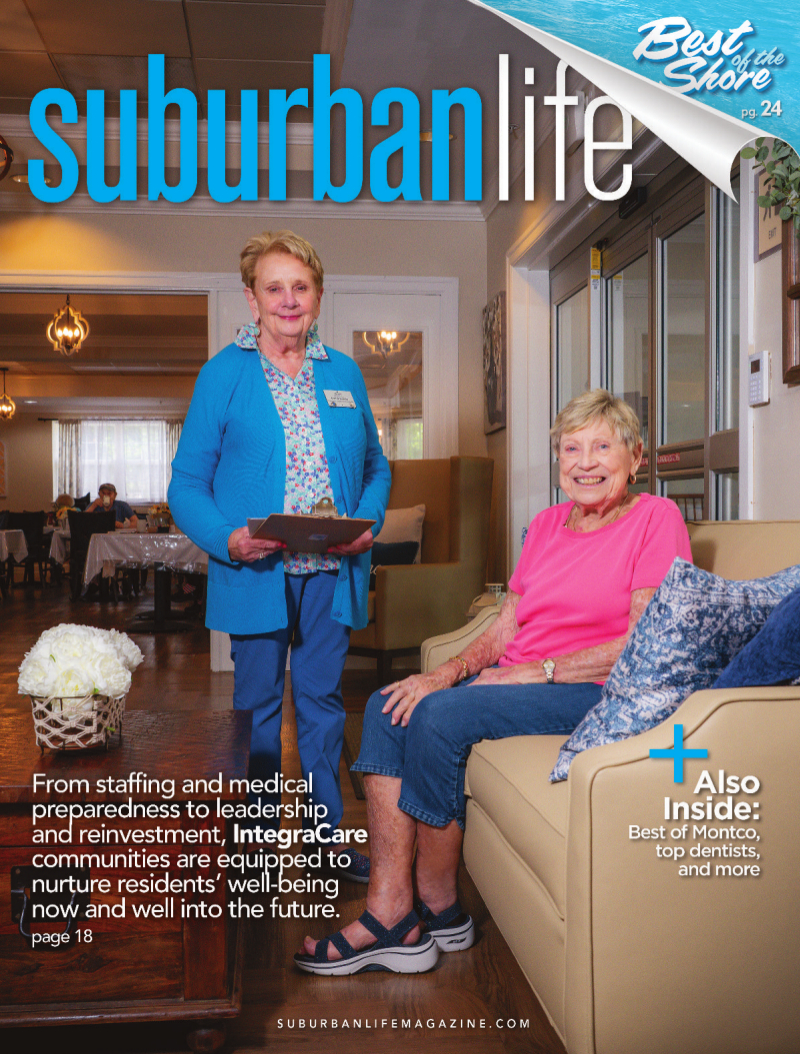
Enduring Care
From staffing and medical preparedness to leadership and reinvestment, IntegraCare communities are equipped to nurture residents’ well-being now and well into the future.
The recent collapse of Crozer Health shone a spotlight on the potential shortcomings of private equity ownership among hospitals. Larry Rouvelas, the CEO of IntegraCare, believes the discussion should go much deeper, to include other institutions devoted to safeguarding health and well-being.
“Basically, a private equity fund raises money for an investment and asks, ‘How do we generate the highest financial return over the next five to seven years?’” he says. “The Crozer Health example raises the question: Is it appropriate for health care?”
The answer, he suggests, depends on the owner’s intentions.
“If the goal is to reinvest and make the facility more valuable over time, then private equity in itself could be appropriate,” he adds. “That wasn’t the case with Crozer Health. Crozier’s owners were betting on a coin toss: Heads, they win; tails, the public loses. And that’s just wrong.”
Rouvelas says the scenario is particularly pertinent in his particular area of expertise: senior housing. As the leader of an enterprise that operates 18 senior living communities in Maryland, Virginia, and Pennsylvania, including two in the Philadelphia area, Rouvelas believes families should carefully evaluate a community’s ownership structure when vetting their options.
“When senior-housing properties are owned by private equity, there are basically two flavors—one that reinvests in the property, and one that strips away,” he says. “Alternatively, a property might be owned by a nonprofit or a real estate investment trust (REIT), and those are very different models than private equity. Nonprofits and REITs look to be steady long-term owners, while private equity wants to create jumps in value.
“Someone who is shopping for senior housing should understand a community’s ownership and the intentions of its leadership,” he continues. “Has the owner been investing money into the property, or only taking it out? A clear way to understand that is to see whether the owner has reinvested in their properties the last few years. If the property needs a $1 million renovation and the owner is taking care of it, that’s great. If not, that should tell you something about the owner’s priorities.”
IntegraCare’s communities in the Philadelphia area—Exton Senior Living and Glen Mills Senior Living—are owned by a REIT “with the goal of holding onto the properties forever,” Rouvelas says. “Those two properties enjoy a double-good: They have a long-term REIT owner, and one that reinvests substantially.”
Over the past four years, more than $5.6 million has been invested in both communities. Some of those renovations include apartment upgrades and expanded amenities, while others have helped reshape how the communities deliver care to residents. For example, Glen Mills converted one wing to a memory-care unit, while both communities created an area called LifeBridges designed to deliver 24/7 personalized care to residents who have greater needs without them having to move into a nursing home.
A commitment to prioritizing the needs of residents also comes by investing in staff. As Rouvelas puts it, “A beautiful building is fine, but what are you doing to retain the great employees who take care of residents, day in and day out?”
Paola Fusaro, area general manager for IntegraCare, points to the company’s Motivational Advancement Program, MAP for short. IntegraCare designed MAP to reward its most promising hourly team members and train them for greater skills and leadership, along with higher compensation.
“Our team members are the lifeblood of what we do,” she says. “If we see individuals who are going above and beyond, we’re going to tell them, ‘We think you have the ability to take your career to the next level.’ An example might be a line cook who is eager to learn and takes great detail in presenting plates or making recipes on their own. It’s looking at that person and saying, ‘You have proven talent, and we think you have what it takes to be a dining experience director.’ We want to give them more skills and knowledge and opportunity, so they can improve their own life and also improve the lives of our residents.”
Investments in employees have, in turn, enabled IntegraCare to expand services to current and prospective residents. One of the most recent examples is 24-hour move-ins for any individuals in need of either a respite stay or permanent residency.
“For people who are in skilled nursing or a hospital and it’s time to go, many people often don’t know where to go next, and it can feel like scrambling,” adds Fusaro. “This program enables us to help. We can have you in our front door within 24 hours, working with discharge planners and even providing transport, if that’s a barrier. We’re here to remove those burdens for residents and their families.”
Nothing is more important than a resident’s well-being, according to Rouvelas. That’s why he and his team continually solicit feedback to determine how to better serve residents. The company considers all feedback precious and often uses it as the basis to improve daily life for residents. Rouvelas cites the responses to one particular question asked on a recent survey: “Do you feel lonely?” Thirteen percent of respondents said they did feel lonely—half the national benchmark of 26 percent—and the company determined the number was far too high.
“We embarked on a campaign to reduce loneliness in our communities, person by person,” he adds. “One resident said she had trouble connecting with family, so we got an iPad and scheduled regular iPad calls between her and her family. It has made her very happy. … Block by block, we fought those battles on an individual basis. IntegraCare wide, self-reported loneliness dropped to 9 percent as a direct result of that campaign. It’s now only one-third the national average.”
For families that have an imminent need for senior housing, Rouvelas underscores the need for some “homework” to make sure a prospective community is equipped to care for their loved ones—now and well into the future.
“Start by asking those important questions,” he adds. “What capital investments have they made into the property, and how much? What programs do they have to retain good employees? What are their average responses to call bells? In terms of health conditions, under what circumstances would a resident be asked to leave? How many nurses are present? I’d also recommend talking to at least one resident who can give the real scoop.
“We’re talking about where the people we love the most are going to be spending the rest of their lives,” he continues. “You want to make sure their health and happiness are in good hands.”
Exton Senior Living
600 N. Pottstown Pike
Exton, PA 19341
(610) 851-4233
www.extonseniorliving.com
Glen Mills Senior Living
242 Baltimore Pike
Glen Mills, PA 19342
(610) 851-4233
www.glenmillsseniorliving.com
600 N. Pottstown Pike
Exton, PA 19341
(610) 851-4233
www.extonseniorliving.com
Glen Mills Senior Living
242 Baltimore Pike
Glen Mills, PA 19342
(610) 851-4233
www.glenmillsseniorliving.com
Photo by Jody Robinson
Published (and copyrighted) in Suburban Life, June 2025.



